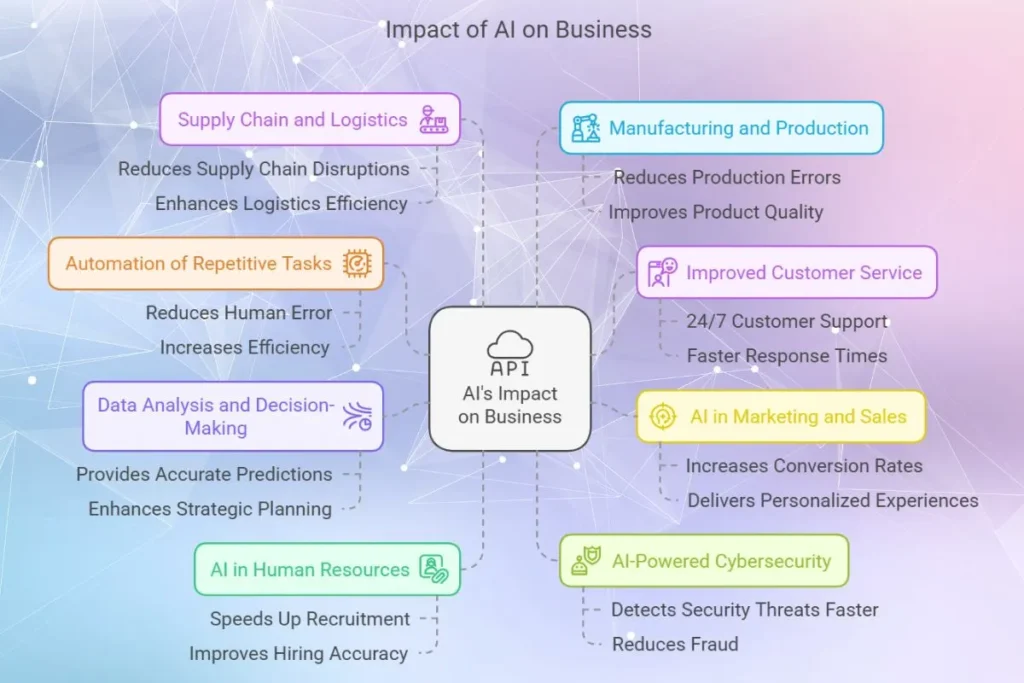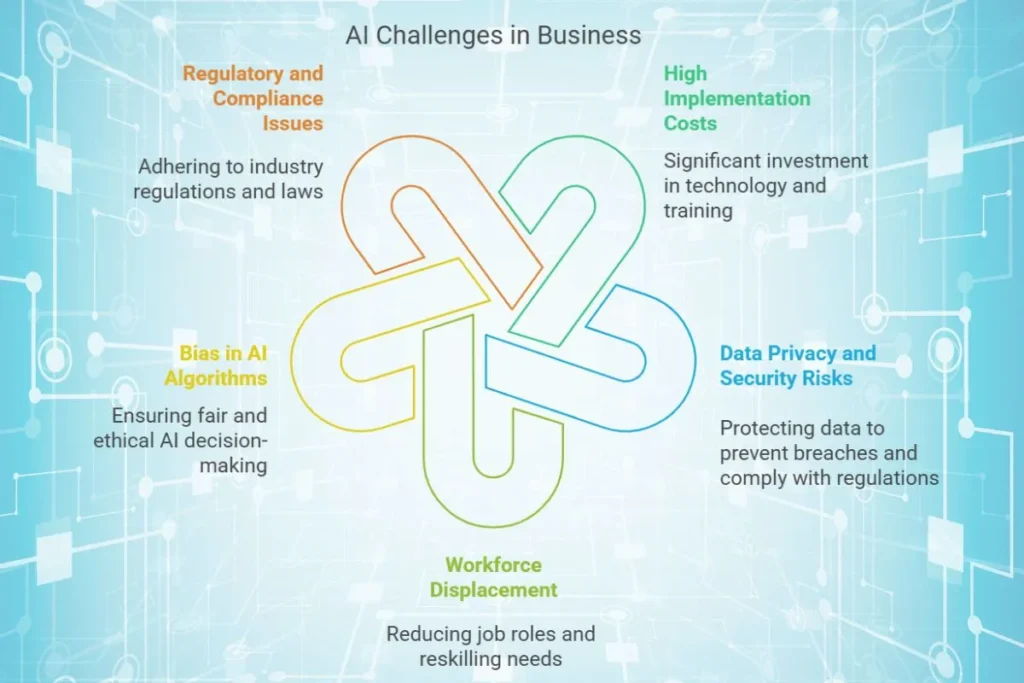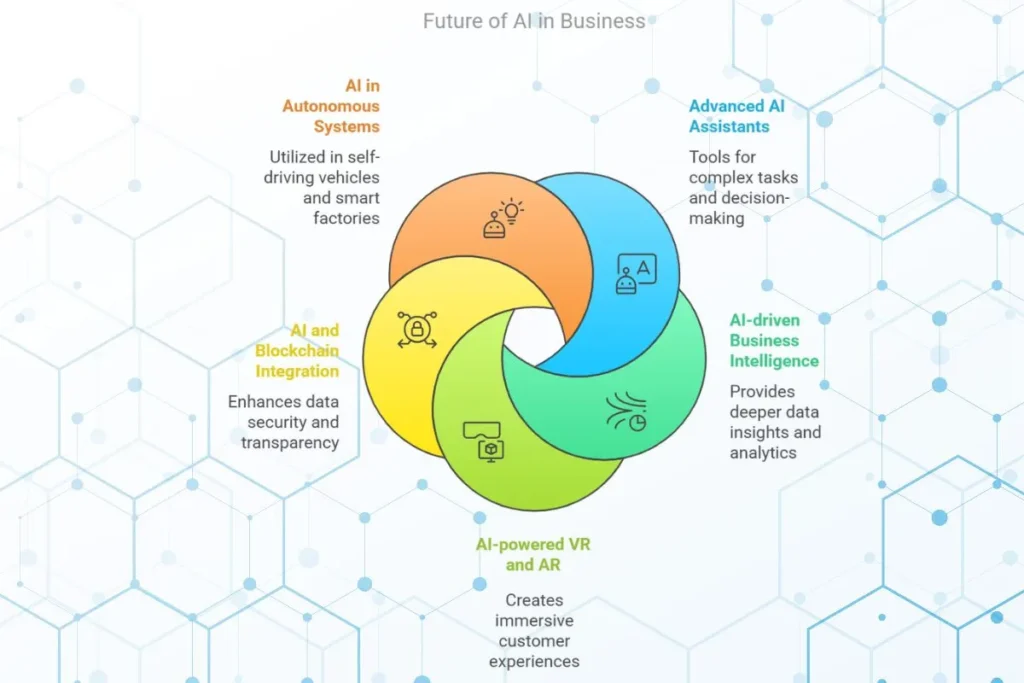Artificial intelligence (AI) has transformed businesses across industries. It automates tasks, improves decision making, enhances customer experiences and drives innovation. Companies use AI to increase efficiency, reduce costs and gain a competitive edge. As AI technology advances, the role of artificial intelligence in business continues to grow, which enables them to offer smarter strategies and improved workflows. Further we shall discuss about the future of AI in business.
The role of AI in Business
Artificial Intelligence is changing the way businesses operate. It has improved productivity, optimized processes and helped companies make decisions based on analyzed data. It streamlines workflows, enhances customer interactions and creates new revenue opportunities. Below are key areas where AI is making a significant difference:
1. Automation of Repetitive Tasks
Many businesses use AI to automate repetitive tasks such as data entry, scheduling and inventory management. AI powered automation tools free up employees to focus on strategic and creative work.
Benefits:
- Reduces human error
- Increases efficiency
- Lowers operational costs
- Enhances employee productivity
A retail company uses AI driven software to manage inventory, automatically restocking products when supply runs low, which prevents stock outs and overstocking.
2. Improved Customer Service with AI Chatbots
AI chatbots handle customer inquiries, provide instant responses and assist with troubleshooting. These virtual assistants improve response times and reduce customer service costs, which leads to higher customer satisfaction.
Benefits:
- 24/7 customer support
- Faster response times
- Reduces the need for human agents
- Increases customer retention
A bank uses an AI chatbot to help customers check account balances, process transactions and answer common questions, which reduces the workload on human representatives.
3. AI in Marketing and Sales
AI powered tools analyze customer behavior, track purchasing patterns and personalize marketing campaigns. Businesses use AI to recommend products, optimize ad targeting and improve customer engagement.
Benefits:
- Enhances customer interactions
- Increases conversion rates
- Improves return on investment (ROI)
- Delivers personalized experiences
An e-commerce company uses AI algorithms to suggest products based on a customer’s past purchases, to increase sales and customer loyalty.
4. AI for Data Analysis and Decision Making
AI processes large amounts of data quickly, identifying trends and feelings that help businesses to make better decisions. Companies use AI for demand forecasting, risk assessment and financial planning.
Benefits:
- Provides accurate predictions
- Enhances strategic planning
- Identifies business opportunities
- Reduces financial risks
A financial firm uses AI to assess market trends and suggest profitable investment strategies, which helps clients to maximize returns.
5. AI in Human Resources (HR)
AI helps HR teams by screening resumes, automating interview scheduling and analyzing employee performance data. It also helps in workforce planning and employee engagement analysis.
Benefits:
- Speeds up recruitment
- Improves hiring accuracy
- Enhances employee management
- Reduces bias in hiring decisions
A company uses AI software to filter job applications, to select the best candidates based on experience, skills and cultural fit.
6. AI Powered Cybersecurity
Businesses use AI to detect and prevent cyber threats. AI analyzes network activity, identifies suspicious behavior and responds to security incidents in real time.
Benefits:
- Detects security threats faster
- Reduces fraud and data breaches
- Protects sensitive business information
- Enhances regulatory compliance
A financial institution uses AI to detect fraudulent transactions and prevent cyberattacks, to safeguard customer data and business integrity.
7. AI in Supply Chain and Logistics
AI optimizes supply chain operations by predicting demand, managing warehouse inventory and improving delivery routes. Businesses use AI to ensure timely shipments and cost effective logistics.
Benefits:
- Reduces supply chain disruptions
- Enhances logistics efficiency
- Lowers shipping costs
- Improves inventory forecasting
A logistics company uses AI powered route optimization to ensure faster and more efficient deliveries, which reduces fuel consumption and operational expenses.
8. AI in Manufacturing and Production
AI powered robots and automated systems enhance production processes, to ensure precision and efficiency. AI helps to detect defects, monitor equipment and optimize supply chains.
Benefits:
- Reduces production errors
- Improves product quality
- Lowers manufacturing costs
- Enhances workplace safety
An automobile manufacturer uses AI driven robots to assemble cars with precision, to reduce defects and increase production speed.

Challenges of AI in Business
Although, AI offers many advantages, businesses must overcome difficulties to implement it effectively.
1. High Implementation Costs
Developing and maintaining AI solutions requires significant investment in technology, infrastructure and employee training. Small businesses may not afford advanced AI tools.
2. Data Privacy and Security Risks
AI systems rely on large amounts of data. Protecting customer and business information is important to prevent data breaches and comply with regulations.
3. Workforce Displacement
AI automation reduces the need for certain jobs. Businesses must reskill employees to adapt to new roles and use AI as a tool for human augmentation.
4. Bias in AI Algorithms
AI systems learn from data, which may contain biases. Businesses need to ensure AI decision making is fair and ethical to prevent discrimination.
5. Regulatory and Compliance Issues
AI implementation must comply with industry regulations. Businesses need to stay updated on AI laws and ensure legal compliance.

The Future of AI in Business
AI will continue to evolve, bringing new opportunities and challenges. Following are the Future trends:
- More advanced AI assistants to handle complex tasks and decision making
- AI driven business intelligence for deeper data feelings and analytics
- AI powered virtual reality (VR) and augmented reality (AR) for immersive customer experiences
- Integration of AI with blockchain for enhanced data security and transparency
- AI in autonomous systems such as self driving vehicles and smart factories
Companies that adopt AI will stay ahead of the competition. Businesses must invest in AI strategies, innovation and workforce training to maximize benefits and drive growth.

Conclusion
AI has made revolution in businesses by improving efficiency, automating tasks and enhancing decision making. AI has offered many advantages to businesses like customer service and cybersecurity etc. However, companies must solve difficulties such as data privacy, cost and workforce impact.
To stay competitive, businesses should explore AI based solutions, train their employees and develop ethical AI practices. AI is a main element to prosper the business with success and innovation in the modern economy.


Your article helped me a lot, is there any more related content? Thanks!